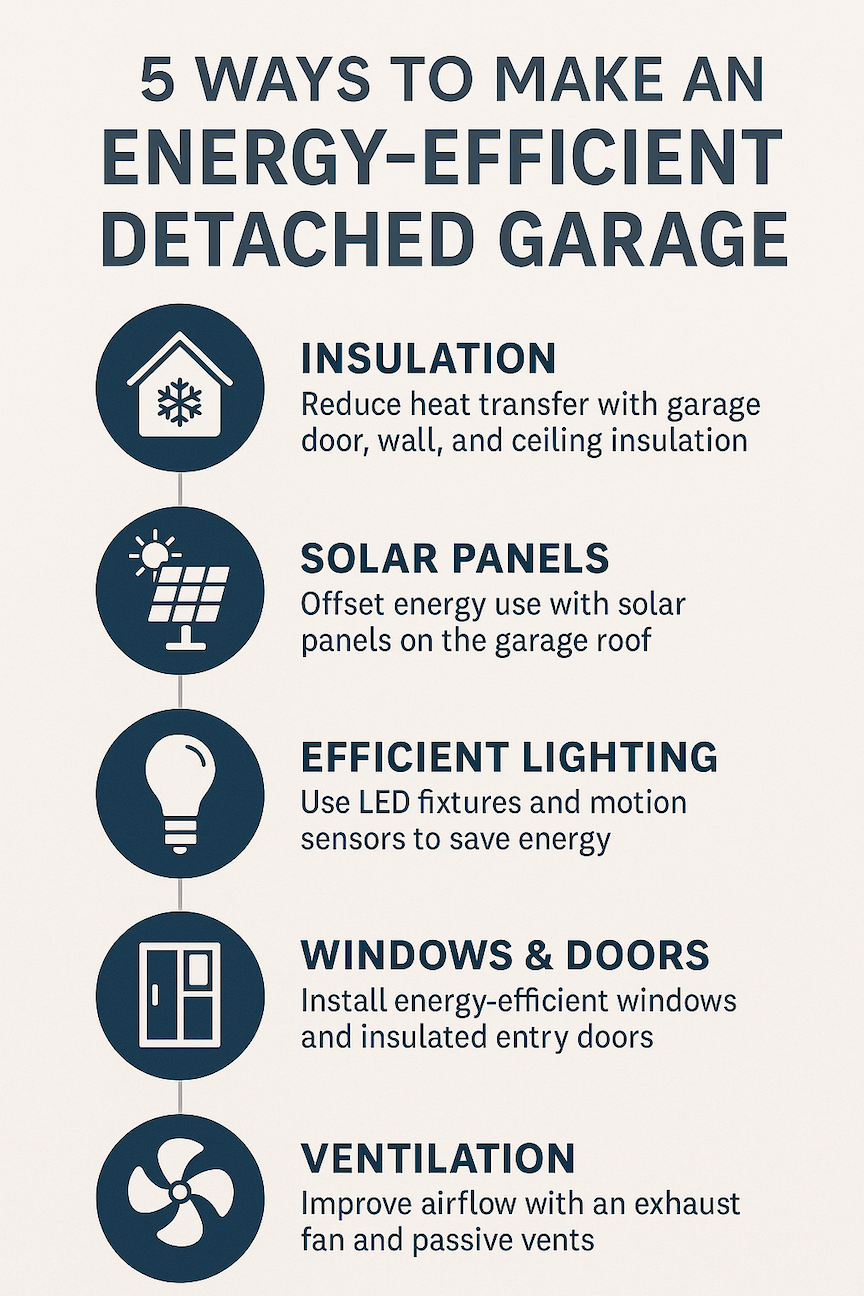Detached garages are more than just storage spaces. They can serve as workshops, hobby zones, home gyms, or even fully finished accessory structures. But if they’re not designed with energy efficiency in mind, they can quickly become expensive to maintain, uncomfortable in Colorado’s variable climate, and less functional than they should be.
At Vertical Contracting, we know that smart garage design starts with durability and efficiency. Whether you’re building a new detached garage or upgrading an existing one, here are five effective ways to make your detached garage more energy-efficient, saving you money and improving year-round comfort.
1. Insulation: The Foundation of Energy Efficiency
Insulation is critical for regulating temperature and reducing heat transfer, especially in Colorado’s climate, where seasonal extremes are common. Many older detached garages were built without proper insulation, leading to significant energy loss.
Key areas to insulate:
- Walls: Use high-quality batt or rigid foam insulation in stud cavities to reduce drafts and retain heat.
- Ceilings and roofs: Prevent heat loss through the roof by insulating attic spaces or vaulted ceilings.
- Garage doors: Insulated garage doors can dramatically cut energy waste, and insulated panels help maintain consistent interior temps.
- Floors: While less common, insulating slabs can prevent cold air from seeping through concrete in winter.
Properly insulating your detached garage can also protect stored tools, equipment, and vehicles from moisture and temperature fluctuations, reducing wear and tear over time.
2. Energy-Efficient Windows and Doors
Windows and side doors are common weak points in garage efficiency. If you’re planning a garage remodel or new build, upgrading these features pays off.
Look for:
- Double- or triple-pane windows: Provide superior thermal insulation and reduce drafts.
- Low-E glass: Helps reflect heat in summer and retain warmth in winter.
- Weatherstripping: Ensure all doors and windows are properly sealed to prevent air leaks.
- Insulated entry doors: Use steel or fiberglass doors with solid insulation cores for maximum performance.
Even small upgrades like caulking around window frames can improve energy retention significantly.
3. Solar Panels: Power Your Garage Sustainably
If your detached garage has sufficient roof exposure, it’s a perfect candidate for solar panels. Whether tied into your home’s energy system or set up as a standalone power source, solar can offset lighting, outlets, and even electric vehicle chargers.
Benefits of solar for detached garages:
- Lower energy bills: Offset utility costs by generating clean electricity.
- Independent power: Ideal for garages with separate meters or workshops with higher electrical loads.
- Sustainability: Reduce your property’s overall carbon footprint.
For a helpful overview of how to assess whether your garage is a good candidate for solar panels, check out EnergySage’s guide to determine if home solar is right for you.
4. LED Lighting and Smart Controls
Lighting is often overlooked in garages, but it makes a big impact on both usability and energy consumption. Traditional fluorescent or incandescent fixtures are energy hogs compared to modern alternatives.
Energy-efficient lighting upgrades:
- LED fixtures: Use up to 75% less energy and last much longer than traditional bulbs.
- Task lighting: Strategically placed lights reduce the need to illuminate the whole space when working in zones.
- Motion sensors and timers: Lights only stay on when needed, reducing unnecessary use.
Consider layering ambient lighting with task lighting over workbenches and storage areas to improve comfort and functionality while keeping your utility bills low.
5. Ventilation and Climate Control
Good ventilation keeps air fresh, reduces moisture buildup, and prevents temperature extremes. Many garages (especially older detached structures) suffer from poor airflow, making them harder to heat or cool efficiently.
Improve your garage’s ventilation with:
- Exhaust fans: Remove hot air in summer or fumes when using tools and chemicals.
- Ridge vents or gable vents: Provide passive airflow that regulates temperature.
- Energy-efficient mini-split HVAC systems: Deliver heating and cooling to detached garages without the inefficiency of extending ductwork.
Adding these systems ensures you’re not wasting energy fighting stale air, trapped heat, or excessive humidity, all common problems in enclosed garage spaces.
Why Work with an Experienced Contractor?
Making your detached garage energy-efficient isn’t just about choosing better products, it’s about smart design, installation, and integration. At Vertical Contracting, we help Denver-area homeowners improve garage performance with insulation, structural upgrades, and modern energy-saving features.
Whether you’re planning a remodel, building new, or simply want to upgrade your existing garage, our team knows how to balance comfort, energy efficiency, and aesthetics for lasting results.
Make Your Garage Efficient and Comfortable Year-Round
Energy-efficient garages aren’t just more comfortable… they protect your belongings, reduce utility costs, and add value to your property. With thoughtful planning and quality materials, your detached garage can function like a true extension of your home.
Ready to explore your options? Contact us today to learn how we can help you build or retrofit a detached garage that works smarter, not harder.
